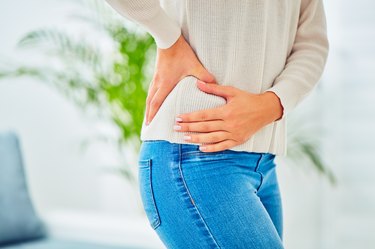
People who exercise might expect to feel muscle soreness after a workout, but not sudden pain in the hip. In most cases, sudden hip pain after exercise results from an injury to a muscle or bone in or around the hip. Fortunately, most instances of sudden hip pain after exercise are preventable with changes in exercise routine and treatable at home with rest and medication.
Read more: Lower Back and Hip Strengthening Exercises
Video of the Day
Video of the Day
Hip Pain After Exercise
Hip pain after exercise might occur in the hip joint or in the muscles, tendons and ligaments that connect to the bones. Pain in nearby areas, such as the lower back, groin or buttocks, can mimic hip pain, as these areas of the body are innervated by the same nerves.
In some people, the hip pain might worsen with certain movements such as rotation of the leg, flexion, extension, abduction or adduction. Pain might also occur during the swing, step or standing phase of movements, such as walking, and the transfer of weight from one leg to another might worsen the hip pain.
Causes of Hip Pain
A fall or injury, such as bumping into workout equipment, can cause hip pain after exercise. Overuse injuries, such as spraining or straining of a muscle, tendon, ligament or bone in the upper leg, lower back or buttocks during exercise, might also cause pain to develop in the hip area. Performing repetitive exercises, such as stair stepping or biking, over a long period of time might cause tendinitis, resulting in hip pain after exercise.
Women who are pregnant are prone to hip pain after exercising due to hormonal effects on the body's joints. Older people might experience hip pain after exercise as a result of osteoporosis or osteoarthritis. Rarely, osteonecrosis, which is death in one of the bones of the hips, can cause pain after exercising. See a health care professional for an accurate diagnosis if you have hip pain.
Treatments for Hip Pain
Most cases of hip pain after exercise are treatable at home by taking a break from exercises that aggravate the pain, along with using pain relievers, such as aspirin or ibuprofen, as recommended by a doctor. Sleeping on the unaffected side and putting a pillow between the knees or using an S-shaped or pregnancy sleeping pillow can also provide hip pain relief.
People with osteoarthritis and osteoporosis might need prescription medications such as corticosteroids to treat their pain, and conditions such as a fractured hip or osteonecrosis might require surgical treatments.
Prevent Hip Pain
Alternating forms of exercise, such as doing the elliptical exerciser one day and yoga the next, can help prevent hip pain associated with repetitive stress injuries. Warming up before exercising and cooling down after can prevent sprains and strains of cold muscles. Swimming can help reduce pressure on inflamed joints, and activities such as walking can help increase bone mass in people with degenerative bone diseases.
Eating a healthy diet with sufficient amounts of calcium and vitamin D or taking supplements as recommended by a doctor can also help prevent bone changes that can lead to hip pain after exercise.
Read more: Food Sources of Vitamin D3
Is this an emergency? If you are experiencing serious medical symptoms, please see the National Library of Medicine’s list of signs you need emergency medical attention or call 911.